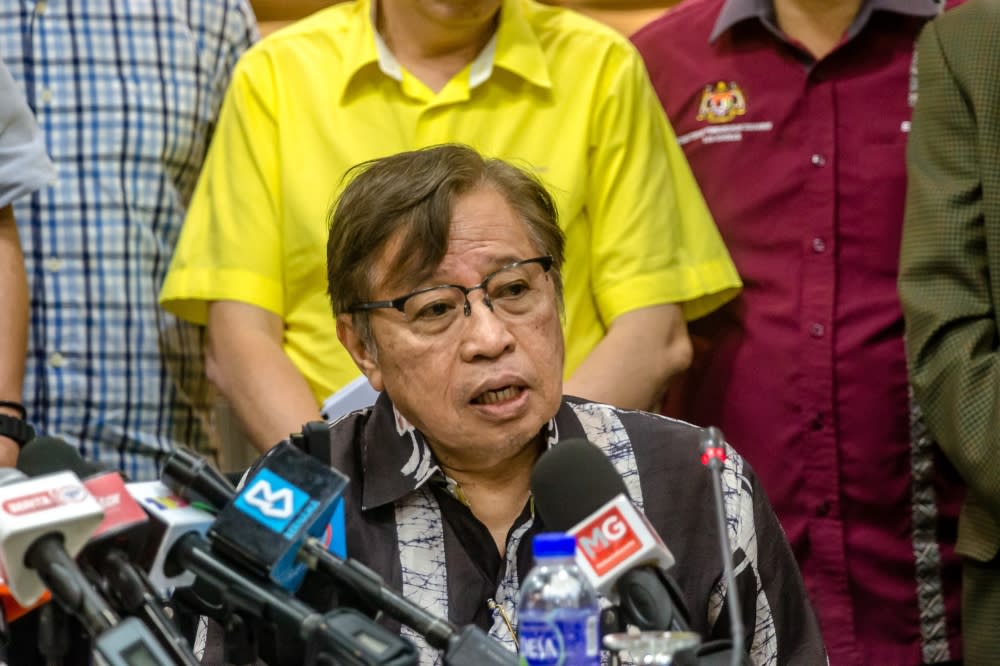Sarawak restructuring economy based on its strength, says Premier Abang Johari

KUCHING, Oct 4 — Sarawak Premier Tan Sri Abang Johari Openg today said the state is restructuring its economy based on its strength which includes its strategic location in the fast-growing region.
He said he strongly believes that Sarawak is capable of emerging as a prominent investment hub offering cost-competitive advantages with good transportation linkages with other parts of the region and the world at large.
“In terms of our economy, Sarawak has maintained a trade surplus over the years from major trading partners in Asia and Europe,” he said at the opening of the 27th World Congress on Innovation and Technology and the 6th International Digital Economy and the 6th International Digital Economy Conference Sarawak here.
He said Sarawak aspires to leapfrog its annual gross domestic products growth at 8 per cent per year to achieve RM282 billion in 2030 from the current 4 per cent per year in 2019 and increase the median monthly household income from RM4,000 (equivalent to US$1,000) to RM15,000 (equivalent to US$3,300) through its development plans by 2030.
Abang Johari noted that Sarawak is a major contributor to Malaysia’s energy sector, primarily through oil and gas production, as well as hydropower generation.
He said the continuous development of infrastructure in Sarawak, exemplified by initiatives like the Sarawak Corridor of Renewable Energy, underscores its aspiration to emerge as a key economic centre in the region.
“However, economic growth must be balanced with environmental sustainability and Sarawak embodies the dual challenge of harnessing its economic potential while aligning with broader global economic and environmental goals,” he said.
He stressed that the Post-Covid-19 Development Strategy 2030 (PCDS 2030), which was launched in July 2021, outlined the initiatives to accelerate Sarawak’s progress to be a developed region by 2030.
“The aspiration of Sarawak is that by 2030, Sarawak will be a thriving society driven by data and innovation where everyone enjoys economic prosperity, social inclusivity and a sustainable environment.
“This will chart the path to strategically position ourselves as a competitive region in this new era,” the premier said.
He said the state government, under PCDS 2030, is giving priority to six sectors such as manufacturing, agriculture, tourism, forestry, mining and social services, for its economic growth.
He added the six sectors are supported by seven enablers, namely digital transformation, innovation, education and human capital, basic infrastructure, utilities, transport, and renewable energy.
He added the PCDS 2030 is reinforced by technology-driven economies, including the digital economy, green economy and circular economy.
He explained that the state is striving to move away from a linear economy to a circular economy, where waste does not exist, products and raw materials are designed to be repeatedly reused as long as possible, and manufacturers design products to be reusable.
“An economy that is low-carbon, resource-efficient and socially inclusive supports sustainable development by promoting the use of renewable energy, reducing waste and pollution and creating green jobs and industries,” he said.
Abang Johari also said plans are in place to begin large-scale commercial production and export of hydrogen by 2027, adding that the state has signed a memorandum of understanding with South Korean companies Samsung Engineering, Lotte Chemical and Posco Holdings for the H2biscus Project in Bintulu.
He said Sarawak Energy Berhad (SEB) hydrogen production plant services and re-fuels hydrogen buses owned and operated by Sarawak Economic Development Corporation.
“Under our Green Energy Agenda, SEB also conducts research on greening the transportation sector through low-carbon fuels.
“We are also exploring other renewable energy sources such as green hydrogen and solar, enabled by renewable hydropower,” he said, adding that SEB recently collaborated with the CHITOSE Group, ENEOS, and Sarawak Biodiversity Centre to launch the CHITOSE Carbon Capture Central Sarawak - the state’s very first industrial microalgae production facility.
"With a successful and strategic partnership between the government, businesses and society, careful planning and a focus on delivery excellence, I am confident that Sarawak will be a thriving society driven by innovation and technology,” he said.
He said, for example, SEB continues to power up new lines, and is now Malaysia’s largest renewable energy producer.
He said Sarawak Digital Economy Corporation has been in a very successful partnership with leading global ICT provider Huawei Technologies for some time, using their telecommunication appliances in digital connectivity development in the rural areas of Sarawak.
“I believe that we are on the right track, as the World Bank recently acknowledged that Sarawak is now a high-income state with a revenue of RM11.96 billion in 2022,” he said.



